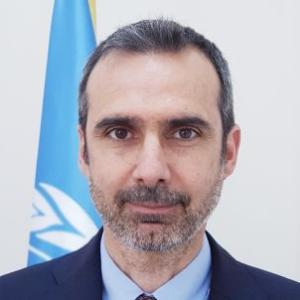Promoting women’s leadership and participation in the local elections is key for Albania
02 May 2023
The local government elections on 14 May are an important opportunity to strengthen local democracy in Albania, and to consolidate past achievements in promoting women leadership in decision-making. Albania has made remarkable progress in promoting women’s political participation.
According to the 2023 “Women in Politics” global map developed by UN Women and Inter Parliamentary Union, the country ranks 1st for share of women cabinet ministers, and 42nd for percentage of women in Parliament, representing an improvement of 12 positions from 2021 when Albania was ranked 54th globally[1]. However, at the local level, women’s representation is still lower compared to men’s: 44% of local councils' seats were won by women during the 2019 local election and in only 8 of the 61 municipalities (13%) women were elected as mayors, which is even lower than EU average.[2]
Ahead of the start of the campaign, the United Nations in Albania reached out to political party leaders, advocating for women’s full and meaningful participation in local elections, and presenting a set of recommendations in three key areas.
First, continue to promote women’s representation at local level: the UN called for political parties to rigorously uphold the 50% gender quotas for the candidates lists for councilors as set forth by the Electoral Code, as well as the active participation of all women and girls in elections both as voters and as candidates, including women and girls with disabilities, Roma and Egyptian women, young women and rural women and girls. The UN specifically called for increasing the number of women candidates for mayoral positions. However, only 15 of 144 mayoral candidates (10.4%) are women[3], which is even lower compared to the proportion of women candidates in the 2019 local elections[4].
Second, address gender bias and harassment against women candidates: political parties participating in the electoral contest should actively collaborate with media outlets and the Audiovisual Media Authority, to ensure adequate coverage of women candidates, and to refrain from the use of derogatory language, gender stereotypes and other types of gender-based violence. A media monitoring report carried out by UN Women during the 2021 national elections in Albania, showed that traditional and social media consistently undermined women candidates. In addition, a study conducted by UNDP confirmed that women politicians, compared to men, are more likely to experience violence. Political parties should take measures to effectively prevent and counter harassment and violence against women in elections, including by amending legislation to address violence against women candidates, voters and elected officials. Women and girls’ free votes should also be safeguarded, through countering family voting, coercion and intimidation of women voters.
Third, consolidate gender equality results at the local level: the 14 May elections provide a unique opportunity to put equal opportunities and participation at the centre of the local political agenda for sustainable development. This includes investing in girls’ education and women’s economic empowerment, as well as strengthening financial and social services such as early childhood development and access to kindergartens. Services should become available to all women and girls, including those most marginalized. Elected leaders should also continue to prioritize the effective functioning and resourcing of local referral mechanisms for coordinated response to domestic violence, as a key instrument to sustain protection and reintegration of women and girls survivors and at risk of violence.
Candidates for local councils and mayoral positions should draw on the European Charter for Equality between women and men in local life, to inform their political agendas and propositions. If elected, they can commit to sign the Charter within the first year of their mandate, and to align the action plans of the Municipality to its provisions. Eighteen municipalities in Albania have already signed the European Charter.
Promoting women’s participation will help Albania make further progress towards the 2030 Agenda for Sustainable Development. Women and men alike must not accept the role of women as passive spectators. They should work together to create an environment of equal opportunities. By including women in decision-making, we are actively contributing to create a more equal society for all.
[1] UN Women and IPU, 2023: https://www.unwomen.org/en/digital-library/publications/2023/03/women-in-politics-map-2023
[2]According to UN Women, in Europe in 2019, the share of women among municipal mayors was 15%, twice lower than the share of women amongst councilors (30%). See page 17 in this publication: https://www.unwomen.org/sites/default/files/2022-01/Womens-representation-in-local-government-en.pdf
[3] https://kqz.gov.al/2023/04/13/2023-local-government-elections-ranking-of-electoral-subjects-and-candidates-for-mayor-in-ballot-determined/?lang=en
[4] According to OSCE, in 2019 there were 11 women out of 97 candidates (11.3%).






